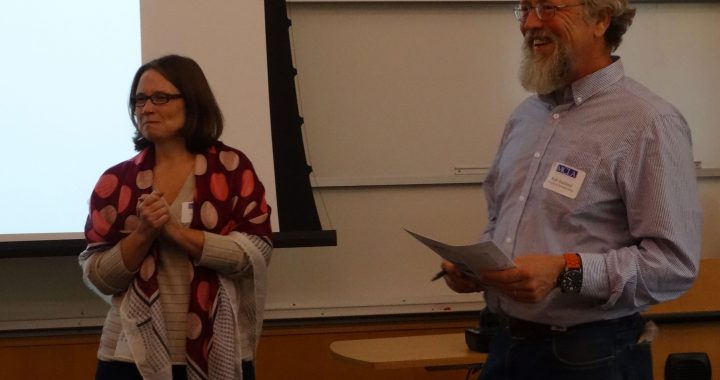In the last three years educational researchers have broadened their focus from a concentration on STEM knowledge and understanding to the broader challenge of measuring “engagement and practice,” according to the National Science Foundation’s Dr. Richard Duschl, speaking at a meeting at Rutgers University on October 13, sponsored by the SENCER Center for Innovation MidAtlantic.
It turns out that employers, too, are engaged in a shift in focus. In his opening keynote address at SENCER Center for Innovation New England’s fall conference four days later, Dr. Brian Fitzgerald, CEO of the Business-Higher Education Forum, sounded a similar note. Speaking at the Massachusetts College of Liberal Arts, Dr. Fitzgerald pointed out that, while many new employment opportunities will require advanced degrees in STEM disciplines (such as “data science”), a detailed analysis of the emerging workforce suggests that there is an even larger demand for “STEM enabled professionals” from every discipline, including the visual arts, economics, psychology, sociology, etc.
What is needed, noted Dr. Fitzgerald, are resilient and creative graduates who can reason, communicate, and “use data analytics tools to represent and unlock insights from data sets to address the big problems facing cities, regions, and industries.” To help meet that need the Business-Higher Education Forum sponsors the National Higher Education Workforce Initiative, which engages Fortune 500 CEOs and the presidents of colleges and universities in a strategic partnership supporting research, teaching, and public policies that ensure undergraduates are prepared for satisfying and meaningful careers in emerging fields.
Slides from Dr. Fitzgerald’s Presentation
In Dr. Duschl’s and NSF’s view, the shift that he and Fitzgerald identified signals a recognition that a STEM capable citizenry will require dispositions and personal capacities, such as ethical reasoning, flexibility, responsibility, and collaboration, in addition to specific knowledge. It also suggests that a more “integrative” approach to STEM learning—one that recognizes student motivation and the role of social, psychological, and neurocognitive factors in the “learning ecology”—will be needed.
Dr. Eliza Reilly, the National Center’s director of programs, who attended both meetings, notes that the convergence of these themes illustrates how “our Centers for Innovation (SCIs) continue to extend the SENCER community of practice by bringing national expertise and current research to their regions, while creating important dissemination and networking opportunities for local constituents from both formal and informal education sectors.”
The Centers have been active: just this month the MidAtlantic SCI hosted two events. The first, held October 10th at LaGuardia Community College, drew attendees from thirteen institutions in New York and New Jersey to hear from participants in the SENCER Engaging Mathematics project, which organizes rigorous math instruction around compelling civic issues that are both relevant and interesting to students.
Project participants presented overviews of the project to newcomers and offered sessions describing courses that taught algebra, statistics, Bayesian reasoning (probability), and mathematical modeling through the lens of complex real-world problems that directly impact their lives, including environmental quality, cancer-survival rates, and student loan interest rates. A detailed report on the presentations and conclusions of this regional conference is forthcoming.
The October 13th lunchtime lecture Dr. Richard A. Duschl, senior advisor to the director of NSF’s Division of Research on Learning in Formal and Informal Settings, was the second SCI MidAtlantic meeting of the fall. His presentation, “Fostering Interdisciplinary STEM Research Partnerships,” was co-sponsored by the National Center for Science and Civic Engagement and the Rutgers Center for Teaching Advancement and Assessment and provided an overview of over fifteen years of educational research findings on STEM learning from the National Research Council, including the groundbreaking How People Learn (1999) and Taking Science To School (2007), for which Dr. Duschl was a lead author.
Dr. Duschl’s informative summary of recent research concluded with a concise set of recommendations for future research and an overview of how the NSF is responding to these new research agendas through programs that encourage interdisciplinary and international collaborations, as well as initiatives that are aimed at bridging the “understanding” gap between researchers and practitioners and informal and formal educators.
The MidAtlantic SCI will be hosting a third fall conference, “Teaching with Technology,” at Barnard College in New York on November 15th. Registration is now open. To register, click here.
“Big Data for Big Problems: Democratizing STEM Skills,” the New England Center for Innovation’s fall conference drew participants from thirteen institutions to explore long-term and multi-sector strategies for developing a “STEM capable” workforce for the 21st century.
Presentations explored the potential of “big data” to clarify and address problems facing every sector of civic and social life. Andres Colubri of Harvard University and Randy Paffenroth of Worcester Polytechnic Institute led a panel discussion on “how students experience data analytics” that included an introduction to developments in data visualization as well as strategies for using publicly available data sets in courses across multiple disciplines.
This rich, one-day meeting offered a range of other offerings on issues of strong interest to faculty “teaching through” civic questions. Service learning, the evolution of a high school engineering curriculum, and undergraduate research were among the session and poster topics presented.
We offer our congratulations and thanks to these and the other SENCER Centers for Innovation, which continue to grow and enrich the community of practice committed to connecting the learning of science to the work of citizenship.

